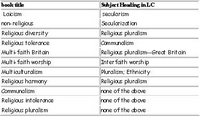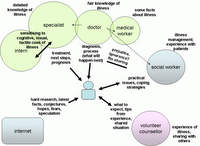...knowledge resides in people: not in machines or documents. [continue reading, The duality of knowledge]
This is my first experience to express the application of the field of Knowledge Management (KM) outside the business and coporate world. My inspiration for this comes from my own Webliography. This Webliography contains many resources and valuable documents. However, today I decided to go deeper into the domains that are less traveled by many KMs.
Here, I would like to go with the terms vertical and tacit knowledge. My aim is to find a connection between, two facets, viz., a) the tacit knowledge and its use by Knowledge Management (KM) profession; and b), how deep is this penetration of KM in non-business circles, or precisely in everyday life. And in doing so I will focus on whatever relates to the individual with in the spiritual, religious and philosophical disciplines.
The bottom line here is to find how a profession can aid in private and personal spaces. I don't need to say too much in this regard. This is well stated by Nancy White. And I quote:
Recently on the KM4Dev (Knowledge Management for Development) list there has been a very interesting discussion on the impacts of major disasters such as epidemics, floods, wars, etc. on the knowledge base of a community or profession. What happens when HIV takes out a significant portion of a community's teachers, or engineers? What happens when the knowledge of local crops is lost during war, famine or natural disaster? What happens when a huge portion of a community's population does not return after a hurricane, depleting the rich knowledge of local history, culture and customs? These are huge issues.
Terminology:
What is tacit knowledge?
By definition, tacit knowledge is not easily shared. One of Polanyi's famous aphorisms is: "We know more than we can tell. Tacit knowledge consists often of habits and culture that we do not recognize in ourselves...
Tacit knowledge is embedded in group and organizational relationships, core values, assumptions and beliefs. It is hard to identify, locate, quantify, map or value. [source]
Netizens, generally, use the term horizontal to imply it as the surface, or more probably to do flat thinking. Whereas, vertical, for the same virtual context, is going in the
deep Web, i.e., going vertically by industry or subject categories [see:
VerticalPortals.com].
Vertical in Religious Connotation:
However, from the faith perspective, there is also a religious analogy to explain the term: vertical. Most religions and spiritualities use this term to portray the connections that matter in the process. And, let me clarify:
When Saint Thomas Church was celebrating its 175th anniversary as a parish in 1998, Bishop Grein spoke at our banquet about what he appreciated in Saint Thomas’s mission in midtown New York. He said, “It has something to do with vertical religion. And by that I mean those expressions and acts of our religion that draw us upward. Jacob’s experience at Bethel would be a good example of vertical religion, that ladder connecting heaven and earth, angels ascending and descending. There he encounters God.” [Religion: Vertical and Horizontal source]
For Judaism, like most of Western culture, the controlling religious metaphor is vertical: religion is a matter of up and down. [An Introduction to Kabballah, source] or Google for more
For a faithful, then, horizontal may refer to
communitas, or a network of communities -- sharing works, words, messages, sermons, etc. In this context, Knowldege Managment (KM) is talking about the tangible, by and large.
Obviously, vertical refers to the top to down (coming from the divine to the soul) or vice-versa. In this context from the knowledge management point of view, it is more so about the tacit, as a dominating source.
One may argue and this possibility does exist. In fact, tacit may also be in horizontal communications and dialogue. For instance, inter-religious or intra-religious dialogue generates such knowledge. This possibility and overlap, is not ruled out. See for instance a citation in this context.
It is an emerging process that has tremendous potential for transforming the way that people communicate and share tacit knowledge in everyday conversation. [source]
Spiritual Healing:
Spritual healing for and by people, the most wanted tool today, is related, by and large, to this tacit knowledge.
As far as the tacit knowledge is concerned, there is a general understanding that theology can't be quantified [See: Russell Stannard, Experimenting with the Divine, Science and Theology News, May 2006].
But, I think, there is no such constraint in measuring the qualititative aspects. In this is the room for discussion and research.
Then, how or what matters in spiritual healing can be surmized in the following:
capturing this tacit knowledge
storing this tacit knowledge
sharing this tacit knowlege
For instance, many faith communities have oral traditions and practices. The first step would be to capture this knowledge-base.
One would also have a look at the following golden rules for tacit knowledge:
1)suspend assumptions and certainties
2) observe the observer
3) listen to your listening
4) slow down the inquiry
5) be aware of thought
6) befriend polarization
For instructions about this best practice lesson go to: Dialogue, by Bill Isaacs, at siliconyogi.com
More on this, as I find during my search, or based on the responses that I get from you all.
----------
Vertical & Tacit:
“Tacit Knowledge” versus “Explicit Knowledge” Approaches to Knowledge Management Practice by Ron Sanchez,
Cecil Hook, “Vertical and Horizontal Worship and Service To God,”
“Vertical religion--that which connects with God explicitly through prayer and repentance… horizontal religion—connecting people through common suffering and celebrating…” details;
“vertical aspiration of faith and spirit and the horizontal service of people's needs,” details
Rev. Barbara Kenley, First Presbyterian Church, Richmond, Indiana. “Sermon”
Main Research Theme: Investigation and Construction of Memory in Everyday Life, Murakami Harumi
Knowledge Management Domains, Tacit, and intangibles:
tacit vs. explicit theories: the impact on our thinking and 'theorizing,' Mentor Cana at November 18, 2004
Knowledge Management + Exoteric-Esoteric Duality
Walter Van Herck, The Role of Tacit Knowledge in Religion
Tacit Knowledge, Encyclopedia of Science and Religion.
Jerry H. Gill (Eckerd College, USA), Tacit knowing and religious belief, article in pdf [requires subscription], International Journal for the Philosophy of Religion. 6 (Summer), pp. 73-88
Victoria Ward and Clive Holtham, The Role of Private & Public Spaces in Knowledge Management
Nancy White comments on: Olaf's Notebook: What is the relation between KM and inner reform?
Higher level KM involves more of tacit knowledge management. article in pdf, requires subscription
David J. Owen, and and Min-Lin E. Fang, Information-seeking behavior in complementary and alternative medicine (CAM): an online survey of faculty at a health sciences campus, J Med Libr Assoc. 2003 July; 91(3): 311–321. full text of the article
“Faith of the Future: Updating Religious Paradigms for the Infotech Age” by Don C. Davis The Futurist, September-October 2005. 4 Pages. Article.
Religious leaders now have a major opportunity to accept the new knowledge and capabilities created by science and technology. The author believes that this acceptance will help guide individuals to a global consciousness and a better understanding of their responsibilities for each other and the future of the world. see Fulltext
Chester, G. & Neelameghan, A. (2006). "Information Professional: Knowledge and Skills Development for Serving Marginalized and Rural Communities." Webology, 3(3), Article 29. Available at: http://www.webology.ir/2006/v3n3/a29.html
Keywords: Rural community; Marginalized community; Information needs study; Information professional; Education and training; Curriculum design; Knowledge and skills; Communication skills; Community knowledge management; Outreach services
Real-Life Knowledge Management: Lessons from the Field, Editors: Abdul Samad (Sami) Kazi & Patricia Wolf
"Through the eighteen case studies presented in this book, we learn about practical experiences in consultancies, financial institutions, fire fighting, global project management groups, public administrations, research and development organisations, small and medium enterprises, sports centres, the aerospace sector, the automotive industry, the construction industry, the IT sector, the maritime industry, the mould and die making industry, the nuclear industry, the oil and gas industry, and the water management sector. The case studies draw from a pool of experience spanning Austria, Belgium, Brazil, Finland, Germany, India, Israel, Italy, Norway, South Africa, the Netherlands, and the United Kingdom."
Review: It’s not often that you get something for nothing but in this case you really can! ‘Real Life Knowledge Management – Lessons from the Field’ is a collection of 18 knowledge management case studies from across Europe and the Middle East... There are some really interesting case studies and the book is beautifully illustrated by Arye and Ron Dvir. Enjoy! Continue reading this review @ A Compound of Alchymie
Understanding knowledge management and information management: the need for an empirical perspective, by France Bouthillier and Kathleen Shearer, Information Research, Vol. 8 No. 1, October 2002
KM, IM, DM - Survival of the Fittest



 The Blog Content Map is helpful organizing diverse material/content.
The Blog Content Map is helpful organizing diverse material/content. 
 You are here
You are here 








